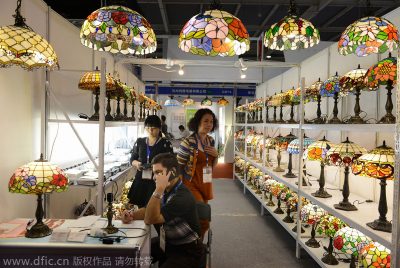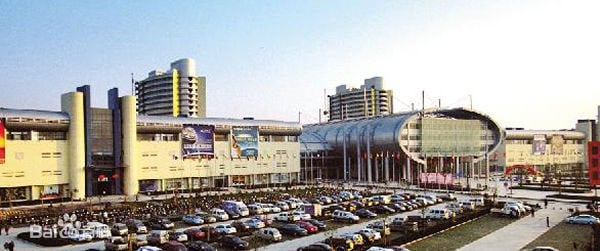
The YiWu Commodities Market
A brief bit of background for context. YiWu is the world’s largest supermarket. YiWu is a small town (it’s actually a city with more than one million people, but in China that’s a small town) in Zhejiang Province, 45 minutes by high-speed rail from Shanghai. The surrounding area contains countless thousands of smallish (and some largish) factories producing vast amounts of small goods – hand and small electric tools, umbrellas, bags and luggage, toys, giftware, small appliances, kitchenware, small electronic items, adhesive tape. The products are mostly standard utilitarian items we generally refer to as commodities.
With this intense concentration of manufacturing clusters, YiWu has the largest commodity markets in the world. The largest wholesale factory market in YiWu, the International Trade Center, consists of eight 5-story buildings totaling about 5 million square meters and containing about 80,000 shops, each shop owned by one of the small area factories. It is so large that the aisles in each building have street names; maps are normally required for navigation. To save you the arithmetic, if you spend 8 hours per day, 5 days per week, with only 1 minute in each shop, you would need more than 8 months to visit all of them. And that’s only one market of about 20 in the city. Many markets specialise in a particular product: umbrellas, artificial flowers, stationery, toys, candles cosmetics, fashion jewellery, bags and leather products shoes, tissue, cloth, socks, lingerie . . . Typical markets would have 2,000 shops selling only belts or 10,000 shops selling small ceramic tea pots.
The YiWu Lighter Industry
One of the locally-produced items is cigarette lighters, this industry around YiWu consisting of about 4,000 families who own and operate about 1000 factories, all producing either components or entire assembled products. These families might consist of only a husband and wife with a few hired hands, or possibly a large extended family from the grandparents, uncles and aunts, and offspring of university-graduated age. In each case, a factory may hire as many or as few outside workers as necessary.
The Business Model
Several years ago, each of the factories produced finished goods, often competing directly with each other, and lacking standardisation or compatibility among them. Over time, various factories proved better at producing some kinds of components than others, while some excelled in assembling or packaging the finished goods. The factory owners met repeatedly to discuss their overall situation and eventually agreed to cooperate and specialise. Today, some factories produce all the various components for a wide range of brands and styles while others focus on assembly or packaging. Each factory in this existing network serves its part in the system to produce sufficient volume to fill all existing orders. However, it is also free to manufacture its own brands of lighters or to produce other products in addition to lighters. So long as the basic cooperative requirements are met, and since each factory is privately-owned, there are no restrictions on activity.
This cooperative functions in a very real sense as a huge, well-organised manufacturer and exporter with tens of thousands of employees and 1000 manufacturing locations – but with no board of directors, no executive-level or middle management, no policy manual, no fancy offices, no bureaucracy and no corporate overhead. Due to the decentralised structure and specialised, tight product focus, the group can move swiftly to meet any challenges. Sometimes the development process from product conception to produced sample can take less than 24 hours. The group can accept and fill orders of any size, the production being done by whichever locations have available capacity.
Financing is never an issue because the capital investment load is distributed so widely, modernisation or the addition of capacity being done in small increments according to the ability and ambition of each manufacturing unit, and of course each person in the entire plan has a vested personal interest in ensuring that costs are kept to a minimum. This structure has an enormous hidden advantage in the existence of perhaps 10,000 marketers, all of whom fill every spare moment searching the internet for more customers for this cooperative enterprise, each having much to gain from this effort since all revenue goes directly into their own pockets.
This loosely-structured but tightly-knit cooperative permitted the myriad small companies to function as a much larger and far more powerful entity, with results that were stunning, YiWu increasing its share of the worldwide lighter market from around 30% to over 70% in only a few years, and the YiWu area generating a GDP of nearly US$ one trillion (one-third that of California). It is worth noting that, aside from some newly-graduated children joining the family business, there are no MBAs here. The entire business model was invented by the older generation, many of whom hadn’t completed their high school education.
It is unlikely that such an entity would long survive in the West, because the Chinese concepts of family, cooperation, harmony, either do not exist in the West at all, or not in the same way or to the same extent. This is only one story of innovation in China. There are countless thousands of others, in ways and places we might never imagine.
There is actually a bit more to this story. At the business school at the university in YiWu, a prerequisite for graduation is that all students must establish and successfully run their own business. These may be only online shops selling any manner of products, but they are all profitable. As well, local students are often sufficiently fluent in many languages to act as agents for the millions of foreign buyers who come to the city each year, helping them to navigate the system, act as translators, find satisfactory products, negotiate prices and terms. Some of these kids earn as much as US$100,000 in a year while still in school. We don’t see this at Harvard or Western, nor do we see student parking lots jammed with BMWs and Ferraris.
*
Larry Romanoff is a retired management consultant and businessman. He has held executive positions in international consulting firms, and owned an international import-export business. He lives in Shanghai and is currently writing a series of ten books generally related to China and the West. He can be contacted at: 2186604556@qq.com He is a frequent contributor to Global Research.
All images in this article are from the author
The original source of this article is Global Research
Copyright © Larry Romanoff, Global Research, 2019



